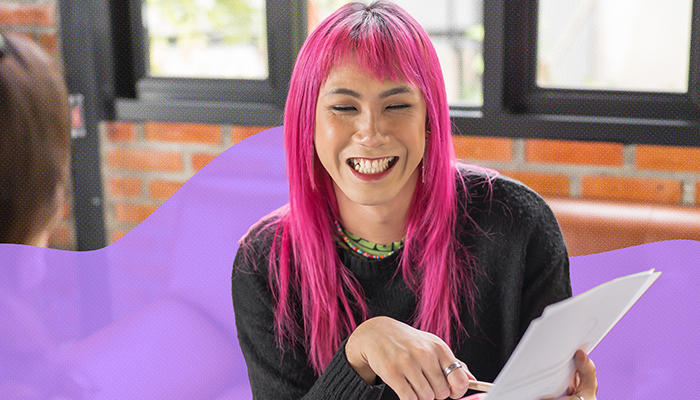Many people might not know that abortion was frequently practiced amongst both indigenous communities and white settler colonies from the 1600s to 1900s in North America. Abortions—both medicinal and herbal—were provided by skilled midwives, nurses, and other people. In fact, they were a regular part of life until the mid-1800s. By 1910, abortion was banned nationwide. However, those with economic and social privileges—specifically wealthy white cis women—could afford to travel to skirt the law and access abortion while others faced a lack of access and criminalization.
Cue the Roe V. Wade case. In 1973, the Supreme Court made its landmark decision to establish the legal right to access abortion in the United States based on protecting the 14th amendment right to privacy. However, due to systemic racism, Black people and other people of color seeking abortion continued to be targeted; the Hyde Amendment limited the reproductive access of low-income people by banning federal Medicaid funding for abortion services. Now, in 2022, we face the possibility that the Supreme Court may vote to overturn the federal protection of abortion rights according to a draft opinion leaked to Politico.
It’s important to take care of your mental health and wellbeing during this particularly heavy and difficult moment in the news cycle. The facts are also important to remember—a draft opinion is, well, a draft. Draft opinions are an internal component of the justices’ deliberative process and can shift before a final ruling. Abortion is still currently legal in all fifty states. While this opinion has not changed any current laws, the leak is yet another attack on the future of reproductive rights and bodily autonomy for people of all genders. Abortion seekers across the country need help now more than ever. We’ve compiled a list of eight abortion funds that you can donate to or get involved with today to help people access the abortions they need.
All types of people across the gender spectrum deserve the right to access abortions. We realize that some of these funds have the word “women” in their titles. While this isn’t by any means representative of all people who need abortions, we believe in the mission and value of these organizations to provide reproductive access to many marginalized people. Additionally, because queer and trans people are everywhere, we acknowledge that they’re more than likely to be recipients of these funds. Lastly, as of the writing of this article, we were unable to find a transgender or non-binary specific abortion fund. Read on to learn more about the abortion funds you can support today.
Indigenous Women Rising
Indigenous Women Rising (IWR) is a Native-led and Native-centered reproductive justice collective that helps provide financial and practical support for abortion seekers in the US and Canada. In 2017, the collective started out as a campaign to bring attention to the fact that indigenous women and people who relied on Indian Health Services for healthcare were being denied access to Plan B, a form of emergency contraception. Now, five years later, IWR has expanded to focus on midwifery support, breastfeeding and birth justice, sex education, and advocacy surrounding reproductive justice-related issues. You can donate to this abortion fund here.
The Brigid Alliance
The Brigid Alliance supports people who must travel long distances across the country to access the abortion care they need, especially for people who are later in their pregnancy. They arrange travel and help cover costs of travel for folks who have to travel to access abortion due to state-level restrictive abortion laws and regulations or lack of local providers. The Brigid Alliance works closely with abortion funds, specialized clinics, and partner organizations across the country to ensure that abortion services are accessible when barriers arise. You can donate to their cause here.
Support Your Sistah (SYS) at The Afiya Center
Support Your Sistah is a practical support fund through The Afiya Center (TAC), a Black-led reproductive justice organization that supports the lives, health, and overall wellbeing of Black wxmen in Texas. It’s the only reproductive justice organization in North Texas founded and directed by Black women. Support Your Sistah assists those seeking abortion care with transportation, drop-in childcare, and occasionally financial assistance to help cover procedure costs. They also offer abortion and birthing doulas support. Their mission statement says: “We understand how government policies control welfare, abortion access, contraception, and planning services, and therefore the SYS Fund treats each individual with confidentiality—full respect and will be unbiased to each situation.” If you would like to volunteer, please reach out to Zee at zedwards @theafiyacenter.org or call the SYS hotline at 972-629-9266. You can donate to the SYS fund here.
Jane’s Due Process
Jane’s Due Process helps young people under the age of 18 navigate the judicial bypass process in states with parental consent and notification laws. In other words, a judicial bypass is permission from a judge that allows a person under the age of 18 to consent to abortion care without parental involvement. This Texas-based organization helps minors legally get an abortion without parental permission. They have a 24/7 hotline at 1-866-999-5263 that you can call or text to help you navigate this process. You can donate to their work here.
Keep Our Clinics by Abortion Care Network
Despite receiving a fraction of public support, independent abortion care clinics provide abortions to three out of five people statistically. In response to this harsh reality, the Abortion Care Network was founded in 2018 as a national network of independent community-based, abortion care providers and their supporters. The Keep Our Clinics campaign helps keep the doors of independent abortion care open because unfortunately, once an abortion clinic closes, it’s nearly impossible to reopen. You can make one-time or recurring monthly donations to this campaign here.
Access Reproductive Care Southeast
People living in the southeastern region face unique barriers and inaccess to abortion care. In effort to bridge the gap and provide care to those facing systemic inequity, Access Reproductive Care Southeast helps provide funding and logistical support to those seeking abortions to Southerners in Alabama, Florida, Georgia, Mississippi, South Carolina, and Tennessee. They also host programming and events, including a peer-to-peer support group for Southerners who’ve had abortions. You can make a one-time or recurring monthly donation here. If you’re interested in volunteering, contact volunteer@arc-southeast.org. Visit their website to learn more about volunteer training programs and more.
Northwest Abortion Access Fund
The Northwest Abortion Access Fund is an abortion fund serving those seeking abortions Washington, Oregon, Idaho, and Alaska. The organization runs a toll-free hotline (866-NWAAf10) staffed by trained volunteers to help assist those seeking abortions. There are different kinds of volunteer opportunities available, such as providing rides and/or homestays, case management, emotional support, and more. To donate, visit their website here.
Midwest Access Coalition
The Midwest Access Coalition serves those traveling to, from, or within the Midwest to access safe and legal abortion services. While this organization explicitly doesn’t provide financial assistance for abortion procedures, their coordinators will work to connect those seeking care to abortion procedure funds they may qualify for. In addition to hosting those seeking abortions, they primarily provide funding for transportation, including travel costs, accommodation, food, medication, and childcare.
Visit here for a complete list of abortion funds. Remember, as of right now, abortion is still legal in all fifty states. To find a clinic near you, click here. Additionally, you can read similar articles related to reproductive health and justice in the Library:
- Transgender Testosterone Hormone Replacement Therapy and Fertility 101
- Estrogen Hormone Replacement Therapy and Fertility
- HRT and Birth Control: What You Need to Know, Explained by FOLX
- What You Need to Know About Medication Abortions
- Queer and Trans Fertility 101
- The Reproductive Access and Justice Resource Guide for Every Type of Activist
If you’re a FOLX member and have any questions related to reproductive health and your medication, please message your clinician. Though FOLX doesn’t prescribe or mediate birth control of any kind, we’re committed to providing LGBTQ+ inclusive sexual health education to our members and beyond.



